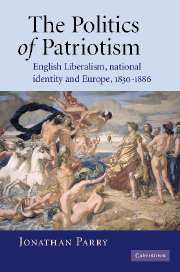Book contents
- Frontmatter
- Contents
- Acknowledgments
- Introduction
- PART I ENGLISH LIBERALISM AND NATIONAL IDENTITY
- PART II EUROPE AND LIBERAL POLITICS
- 3 Liberalism and the Continent, 1830–1847
- 4 The 1848 revolutions and the triumph of liberal patriotism
- 5 Italian unification and the search for an ethical nationhood
- 6 The Franco-Prussian War and the destruction of the first Gladstone government, 1870–1874
- 7 The Eastern question and its consequences, 1875–1886
- Conclusion: Liberalism, state and nation
- Abbreviations and select bibliography
- Index
3 - Liberalism and the Continent, 1830–1847
Published online by Cambridge University Press: 17 July 2009
- Frontmatter
- Contents
- Acknowledgments
- Introduction
- PART I ENGLISH LIBERALISM AND NATIONAL IDENTITY
- PART II EUROPE AND LIBERAL POLITICS
- 3 Liberalism and the Continent, 1830–1847
- 4 The 1848 revolutions and the triumph of liberal patriotism
- 5 Italian unification and the search for an ethical nationhood
- 6 The Franco-Prussian War and the destruction of the first Gladstone government, 1870–1874
- 7 The Eastern question and its consequences, 1875–1886
- Conclusion: Liberalism, state and nation
- Abbreviations and select bibliography
- Index
Summary
As will already be clear from Part I, the Whig governments of the 1830s left an ambivalent legacy. They laid many of the foundations of nineteenth-century Liberalism, but the strategies they adopted also opened them to severe criticism from Radicals and others, especially in the 1840s. The principal components of this criticism were their preference for giving cabinet posts to aristocrats, their coolness to further constitutional reform, their enthusiasm for a sweepingly interventionist and national social policy, their belief in spending taxpayers' money on endowing religion in Britain and Ireland, and their failure to stop expenditure rising in the late 1830s. To many Chartists and other Radicals their poor-law and prison policies seemed offensively illiberal and hypocritically moralistic; yet both Anglicans and Nonconformists found their educational and religious policies insufficiently respectful of true religion and alarmingly heterodox, utilitarian or flippant. The result was a very powerful double shift of mood in the 1840s, away from ‘aristocratic’ and centralising government on the one hand, and in search of a moral reformation on the other. Whig patriotism was severely questioned.
Many themes of the 1830–47 period had an international context. This chapter confines itself to those issues which are most useful in understanding later Liberal politics. It considers, firstly, the fate of the two elements of Liberal strategy in the 1830s which had the clearest ‘continental’ relevance, each of them identified with one of the two leading Liberals of the next thirty years, Russell and Palmerston.
- Type
- Chapter
- Information
- The Politics of PatriotismEnglish Liberalism, National Identity and Europe, 1830–1886, pp. 129 - 171Publisher: Cambridge University PressPrint publication year: 2006

